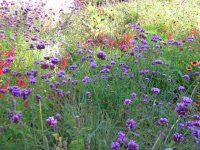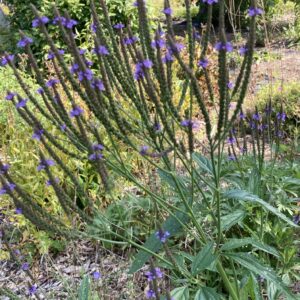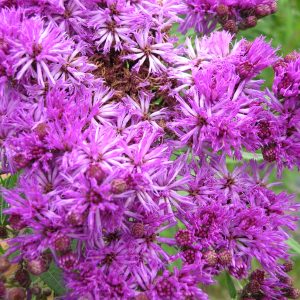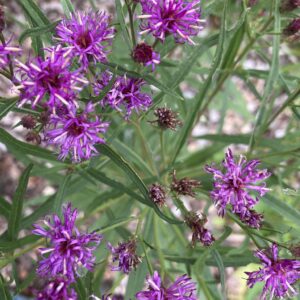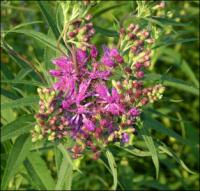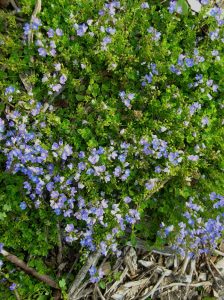Plants for Butterflies and Other Pollinators
Showing 209–216 of 223 results
-
Tradescantia bracteata Spiderwort Z 4-9
rosy purple flowers July-August
rosy purple flowers July-August
Size: 12-18” x 12”
Care: full sun to part shade in moist well drained soil
Native: Minnesota south to Texas
Wildlife Value: attracts bees & butterfliesGenus named after John Tradescant the Younger, an English botanist, who introduced Tradescantia virginiana to garden cultivation in 1637, when he sent it to his father, gardener to King Charles I. This prairie plant collected before 1938.
-
Verbena bonariensis Perennial Z 7-10, colder zones-reseeding annual
Small purple flowers atop tall leafless stems from July to October. Great see-through blooms for growing in back, middle or front of the garden.
Small purple flowers atop tall leafless stems from July to October. Great see-through blooms for growing in back, middle or front of the garden.
Size: 3-4’ x 8”
Care: full sun in moist, well-drained, fertile soil - self-seeder
Native: South America
Awards: Royal Horticultural Society Award of Merit & Missouri Botanic Garden Plant of Merit.Introduced to garden cultivation from its native Buenos Aires in 1726 by the Sherard brothers.
-
Verbena hastata Blue vervain, Simpler’s joy Z 3-9
Bright purplish-blue candelabra-like spikes from July to September
Bright purplish-blue candelabra-like spikes from July to September
Size: 2-4’ x 2’
Care: sun to part shade in moist or moist well-drained soil
Native: eastern 2/3rds of No. America, Wisconsin native
Wildlife Value: Cardinals & Sparrows eat the seeds. Food for larvae of Buckeye butterfly.Native Americans used plant as remedy for coughs, colds and fever. Mahuna Indians of So. California used the root to cure complicated stomach fevers. Sioux fed the seeds to their horses to give them energy. The Sioux also used it as an insect repellant. Pressed specimen in Emily Dickinson’s herbarium.
-
Vernonia fasciculata Prairie Ironweed Z 3-7
Dense clusters of true royal purple July-September
OUT OF STOCK
Dense clusters of true royal purple July-September
Size: 3-4’ x 2-3’
Care: sun to part shade in moist to moist well drained soil
Native: so central Canada to central & eastern US
Wildlife Value: Butterfly attractor – Fiery skipper, deer & rabbit resistant.Lakota Sioux: “The leaves are formed into a sort of “plate” that keeps foreign matter from getting on meat. An infusion of the root is used to regulate menstrual periods.”
Collected by French planthunter André Michaux (1746-1802) who spent 11 years exploring America for plants. Named to honor Wm. Vernon (1666-1711) English botanist who collected plants in late 1600’s. -
Vernonia lettermannii Threadleaf ironweed Z 4-9
Deep purple inch-wide flower heads top unbranched stems forming a dome in late summer-early fall
Deep purple inch-wide flower heads top unbranched stems forming a dome in late summer-early fall
Size: 24” x 36”
Care: sun in well-drained to moist well-drained soil
Native: Arkansas and OK
Wildlife Value: attracts numerous butterflies and pollen source for bees, deer resistant
Awards: Pennsylvania Horticultural Society Gold Medal 2023Collected on “Cooper’s Creek by Dr. J.M. Bigelow and on the sandbars of the Washita,.” Proc. Amer. Acad. Arts xvi. (1881) 78. 78 1880. “Notes on Some Compositae” The species named to honor George Lettermann (1840-1913) who was primarily interested in trees and, while working for the US Census he collected tree specimens in forests of Missouri, Arkansas, western Louisiana and eastern Texas.
-
Vernonia noveboracensis Ironweed Z 4-8
Heads of numerous deep, royal purple, platter-forming flower several feet high above in late summer
Heads of numerous deep, royal purple, platter-forming flower several feet high above in late summer
Size: 6-7' x 3'
Care: Sun in moist to moist well-drained soil
Native: Massachusetts to Florida
Wildlife Value: attracts butterfliesNamed for English botanist William Vernon. Infusions of the plant used by Cherokee to relieve pain after childbirth, for loose teeth and for stomach ulcers.
-
Veronica gentianoides Gentian speedwell Z. 4-9
Erect spikes of pale blue flowers sprouting above clumps of basal foliage in late spring/early summer.
Erect spikes of pale blue flowers sprouting above clumps of basal foliage in late spring/early summer.
Can not ship to: Illinois
Size: 18" x 12"
Care: sun to part shade in moist well-drained soil
Native: eastern Europe
Wildlife Value: attracts butterflies
Awards: England's Royal Horticultural Society Award of Merit.According to Christian tradition, as Jesus carried the cross to Calvary, a woman wiped his face with her handkerchief, leaving the imprint of the features of his face, the vera iconica, meaning “true likeness.” When the Catholic Church canonized the woman, the Church gave her the name Saint Veronica. Medieval gardeners named the plant after her due to the perceived likeness of the flower to her handkerchief. Introduced to European gardens by 1784.
-
Veronica liwanensis Turkish speedwell Z 4-8
Tiny true blue saucers smother the ground
OUT OF STOCK
Tiny true blue saucers smother the ground in May & June – groundcover, front of border or rock garden plant.
Size: 1” x 18” spreader over time
Care: sun to part shade in moist well-drained to well-drained soil
Native: NE Anatolia, Caucasus
Wildlife Value: attracts butterflies
Awards: 1997 Plant Select Winner.Collected before 1849.


